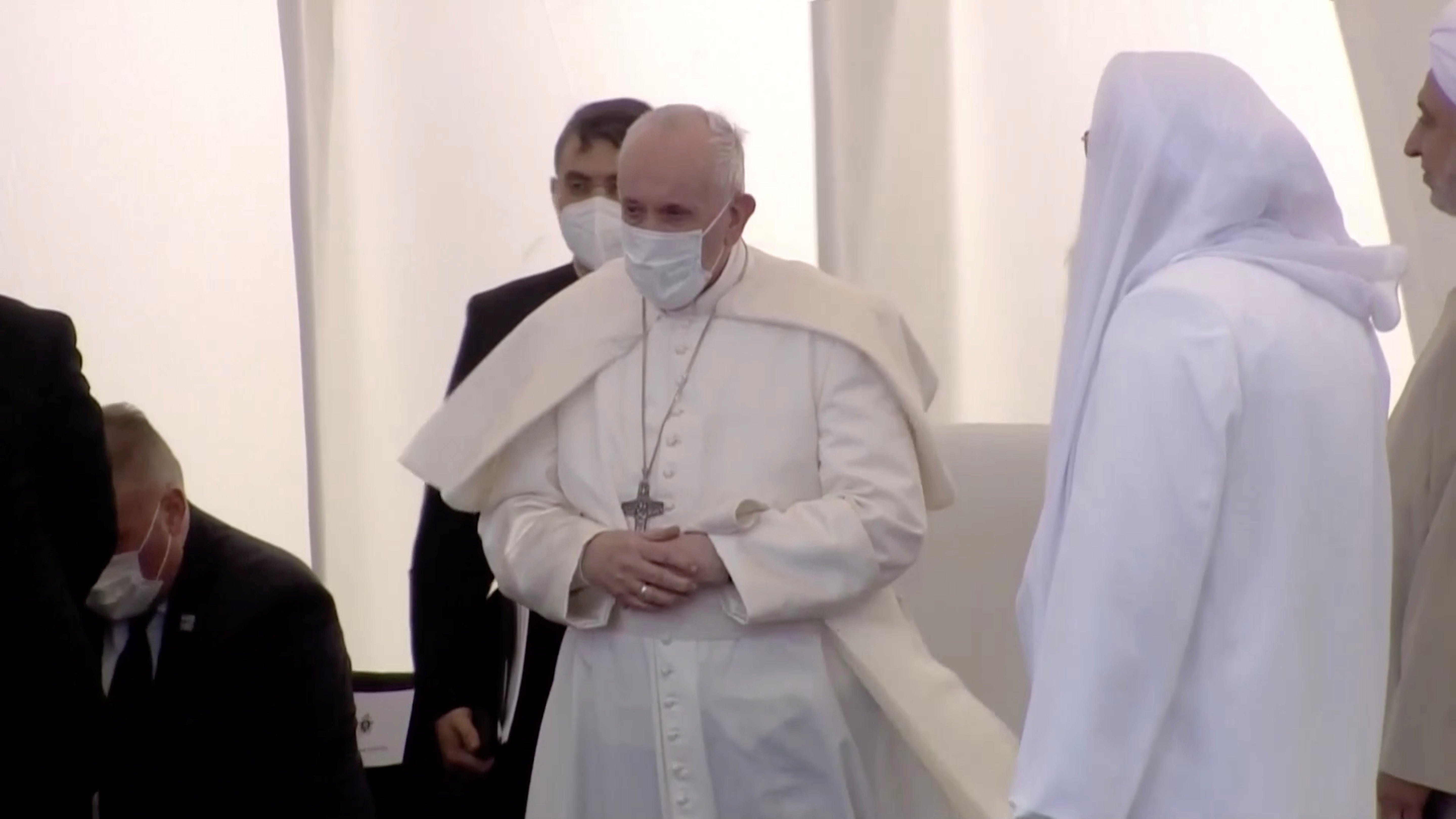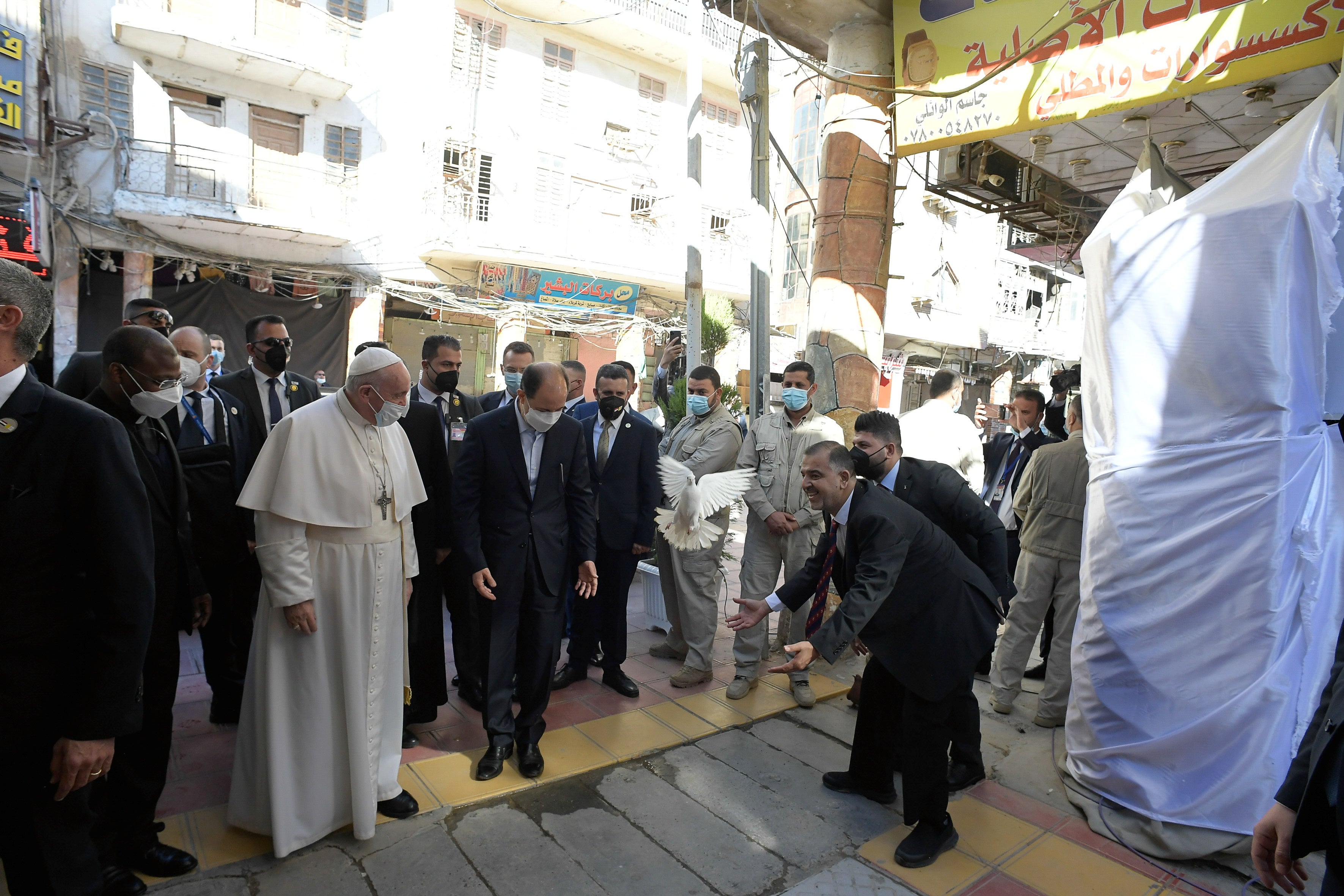‘Erase the language of war’: Pope Francis in historic meeting with Iraq’s top Shia cleric
Grand ayatollah Ali al-Sistani says Christians should be able to live in peace and coexistence in Iraq
Pope Francis has met with Iraq’s most senior Shia cleric, grand ayatollah Ali al-Sistani, in a symbolic appeal for religious coexistence.
On the second day of his whirlwind tour of the country, Francis travelled from Baghdad to the southern holy city of Najaf.
Ayatollah al-Sistani, 90, a highly influential cleric both at home and abroad, has played a large role in the modern history of Iraq. Thousands of people volunteered to fight Isis on his advice in 2014, while a speech he gave in 2019 led to the resignation of the then prime minister Adil Abdul-Mahdi.
The private meeting between the two religious leaders was held in al-Sistani’s humble home, located down a narrow alley in Najaf, and lasted roughly 45 minutes. It is likely to have touched on the country’s dwindling Christian population.
Following the meeting, al-Sistani said in a statement: “Religious and spiritual leadership must play a big role to put a stop to tragedy ... and urge sides, especially great powers, to make wisdom and sense prevail and erase the language of war.”
He added that Christians, like all other Iraqis, should be able to live in peace and coexistence.
For his part, Pope Francis thanked al-Sistani for having “raised his voice in defence of the weakest”, according to the Vatican.
After the historic meeting of the two religious leaders, Iraq’s prime minister Mustafa al-Kadhimi tweeted that 6 March would now be known as the National Day of Tolerance and Coexistence.
Due to militant attacks and Isis’s takeover, hundreds of thousands of Christian Iraqis have fled the country in recent years, with the religious minority’s population falling from more than a million in 2003 to around 200,000 today.
Francis landed in Iraq on Friday and, speaking from Baghdad’s presidential palace, called for “an end to acts of violence and extremism” in the country.
“Iraq has suffered the disastrous effects of wars, the scourge of terrorism and sectarian conflicts often grounded in a fundamentalism incapable of accepting the peaceful coexistence of different ethnic and religious groups,” he added.

On Friday, the Catholic leader also visited a church in Baghdad where 50 worshippers were murdered by Islamist gunmen in 2010. He said their deaths were a reminder that “violence or the shedding of blood is incompatible with authentic religious teachings”.
After his time in Najaf, the Pope travelled to the ruins of Ur, the birthplace of the prophet Abraham, a prophet common to Judaism, Christianity and Islam. He told an interfaith group there: “This is true religiosity: to worship God and to love our neighbor.”
Francis will head to Mosul – a city devastated by Isis - on Sunday, and will bless churches used as firing ranges by the militant group.
His visit comes shortly after a wave of rocket attacks and suicide bombings in Iraq, as well as a rise in coronavirus infections.

Christians in Iraq have stressed the important of the papal visit and the need for change in the country.
Earlier this week, Jameel, 32, a Christian from Qaraqosh in northern Iraq, told The Independent: “A lot of world leaders and people have refused to come to Iraq because of the security situation so it is important that he has decided to visit despite the potential dangers.”
“We know this will bring hope – but we need action and change,” he added.
Additional reporting by agencies



Join our commenting forum
Join thought-provoking conversations, follow other Independent readers and see their replies
Comments